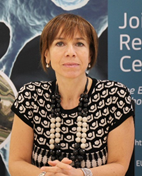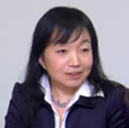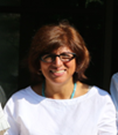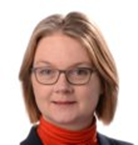On Thursday 28 October, Her Royal Highness Princess Margriet and Professor Pieter van Vollenhoven opened the Centre for Disaster Resilience (CDR) at the University of Twente’s Faculty of Geo-Information Science and Earth Observation (ITC). The opening of the centre coincided with the 70th anniversary of the ITC and represents the culmination of the faculty’s expertise to date in the field of disaster resilience, the underlying causes of disasters.
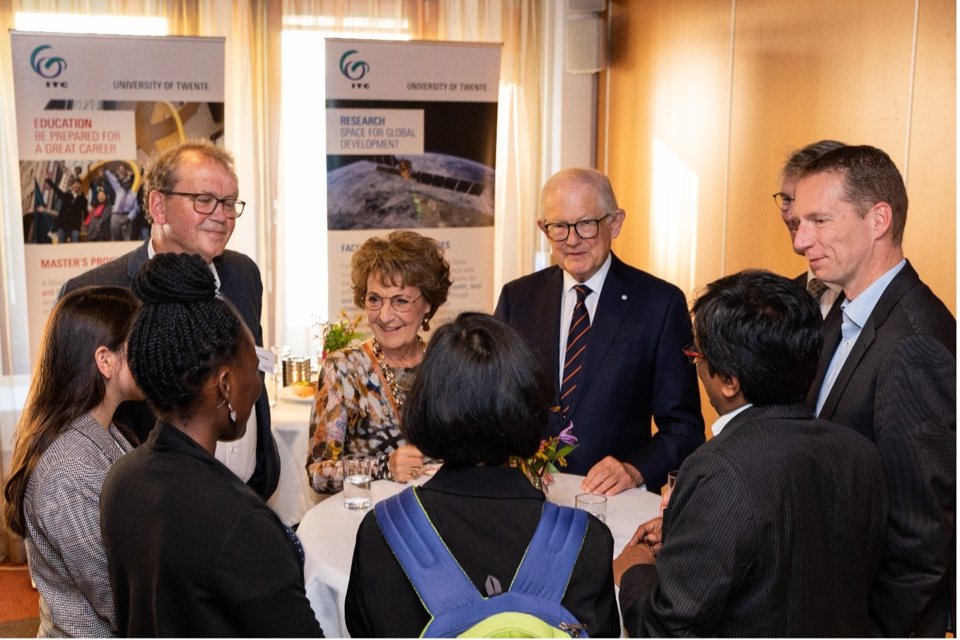
H.R.H Princess Margriet and Professor Pieter van Vollenhoven meet our students. Photo by Annabel Jeuring.
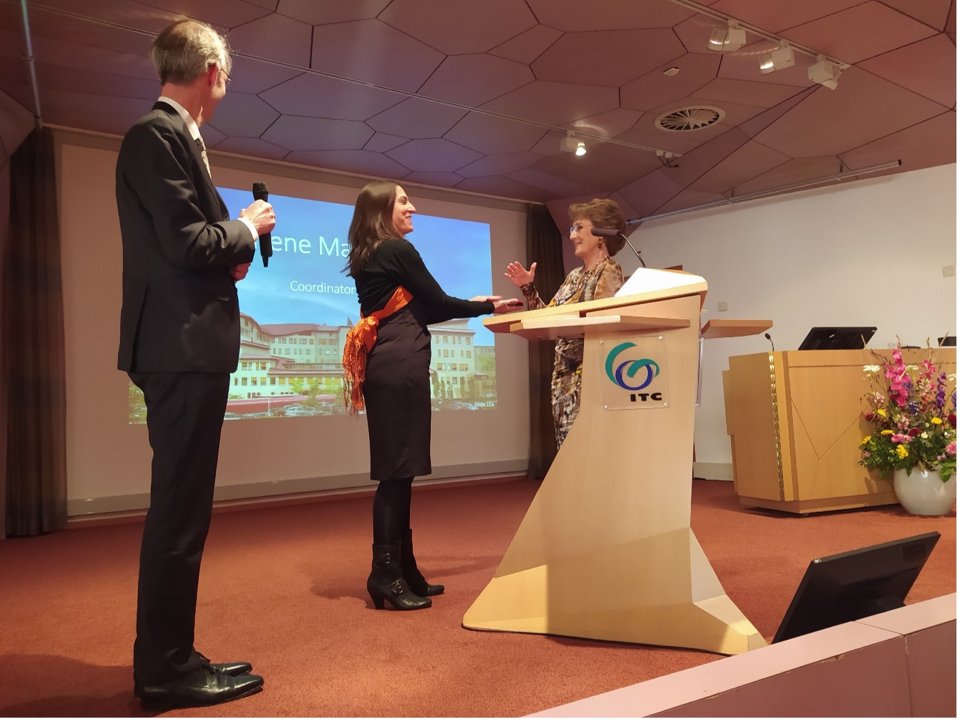
H.R.H. Princess Margriet pressing the red button together with Dr Irene Manzella, coordinator of the Centre, for the official launch. Photo by Cees van Westen.
Disasters devastate lives and livelihoods. The most vulnerable are hit hardest. In the face of rising risks, resilience is essential to enable sustainable development. Today we discuss how to address these critical challenges, and launch ITC’s new Centre for Disaster Resilience.
ITC’s mission is to empower society through capacity development, particularly in developing countries, and to co-create geospatial solutions that address global challenges, such as climate change, increasing disaster impacts, population growth, and related claims for sufficient and secure food, water, energy, health, land and housing (in accordance with the UN SDGs, Paris Agreement and Sendai Framework on Disaster Risk Reduction). Within ITC there is ample expertise on the application of geospatial technologies to assess risks and foster resilient societies.
Disaster resilience is a global impact theme within ITC, and has been a major and growing research, education and project direction for the past decades. ITC has been a Centre of Excellence in this field (initially as the United Nations University-ITC School on Disaster Geo-Information Management, and since 2018 as a Centre of Excellence under the Integrated Research of Disaster Risk initiative (IRDR, a collaboration of UNDRR and ICSU). We also contribute to the Intergovernmental Panel on Climate Change (IPCC), and partner in global initiatives such as the Anticipation Hub. ITC’s new Centre for Disaster Resilience is the logical next step, bringing together expertise from across ITC with the knowledge and experience from our networks to foster resilient societies.
The disaster resilience day at ITC will consist of four sessions of 90 minutes each.
SESSION1 KEYNOTE PRESENTATIONS: DISASTER RESILIENCE IN PRACTICE (09:00 – 10:30)
| Freek van der Meer (Dean ITC) – Opening of the day |
09:15-09:45 | Fausto Guzzetti General Director of the Office III for Technical and scientific activities for the prediction and preventionof risks, of the Italian National Civil Defense Department, and office of the Italian Prime Minister. |
09:45-09:50 | Q and A |
09:50-10:20 | Sekhar Lukose Kuriakose Member Secretary (ex-officio), KSDMA & Head (Scientist), State Emergency Operations Centre, Govt. of Kerala, India |
10:20-10:25 | Q and A |
10:25-10:30 | Desiree Hoving - Closing |
10.30-11:00 | Break |
SESSION 2 HOW CAN GENDER EQUALITY, DIVERSITY AND INCLUSION SUPPORT RESILIENCE? (11:00 – 12:30)


In this session, female scientists and practitioners talk about gender equality, diversity and inclusion in disaster risk science and practice.
Please join our questionnaire on Gender Equality, diversity and inclusion.

11.00-11:0 | Desiree Hoving - Opening |
11:04-11:12 | Alessandra Zampieri Head of the Disaster Risk Management Unit of the EU-JRC |
11:12-11:20 | Mika Shimizu Associate Professor in Graduate School of Advanced Integrated Studies in Human Survivability, Kyoto University |
11:20-11:30 | Madhumita Chatterji ABBS School of Management, Bangalore |
Panel discussion
11:30-11:35 | Funda Atun - Introduction and setting the stage |
11:35-11:40 | Desiree Hoving - Opening and introduction of the panelists |
11:40-12:25 | Panel discussion with: |
12:25-12:30 | Desiree Hoving - Closing |
12:30 - 13:00 | Lunch buffet |
12:45-13:20 | Registration session 3 inauguration CDR |
SESSION 3 INAUGURATION OF THE UT-ITC CENTRE FOR DISASTER RESILIENCE (CDR) (13:30 – 15:00)
13:30-13:35 | Freek van der Meer - Word of welcome |
13:35-13:40 | Maarten van Aalst - Introducing H.R.H. Princes Margriet and Prof. van Vollenhoven |
13:40-13:50 | Prof. van Vollenhoven - his view on Disaster Resilience |
13:50-14:00 | H.R.H. Princes Margriet - her view on Disaster Resilience |
14:00-14:10 | Official opening of the CDR by H.R.H. Princes Margriet and Irene Manzella |
14:10-14:15 | Maarten van Aalst - Word of thanks |
14:15-14:25 | Irene Manzella - Introduction to the Centre and its ambitions |
14:25-14:30 | Congratulations from alumni |
14:30-14:55 | Diana Reckien - key-note lecture |
14:55-15:00 | Irene Manzella - closing |
15:00-15:30 | Break |
SESSION 4 COLLABORATION & NETWORKING (15:30 – 17:00)
Panel on communication
15:30-15:35 | Desiree Hoving Opening and introduction |
15:35-15:50 | Self introduction of the panellists |
15:50-16:10 | Panel discussion |
16:10-16:15 | Desiree Hoving - closing |
Panel on networking
16:20-16:25 | Desiree Hoving Opening and introduction |
16:25-16:40 | Self introduction of the panellists |
16:40-17:00 | Panel discussion |
17:00-17:15 | Desiree Hoving - closing |
17:15 | Closing drinks |
SHORT BIOS OF OUR SPEAKERS
| Alessandra Zampieri (JRC, Head of E1 Unit) Her career started in Brussels, where she joined the European Commission immediately after graduating in Economics, at the University of Genoa. She spent several years formulating transport policies, first in the competent Commission services and then in the Cabinet of Vice President De Palacio. In 2009 she joined the Joint Research Centre as Head of the Maritime Affairs Unit tasked with developing scientific and technological methodologies for EU policies related to the sea. Subsequently she was appointed Head of the Demography, Migration and Governance Unit where she was responsible for the Knowledge Centre on Migration and Demography (KCMD) that aims to provide EU migration policymakers with policy-relevant knowledge and evidence-based analysis. |
| Mika Shimizu, Associate Professor in Graduate School of Advanced Integrated Studies in Human Survivability, Kyoto University Mika Shimizu is an Associate Professor in Graduate School of Advanced Integrated Studies in Human Survivability, Kyoto University. Previously, she served as a policy researcher at the Nomura Research Institute, America, as a special assistant at the Japanese Embassy in Washington DC, and as a visiting researcher in the East-West Center in Honolulu in the United States. She holds an MA from American University and a Ph.D. in International Public Policy from Osaka University (2006). She has been extensively involved in policy research projects related to global issues, natural disaster/infectious diseases, and resilience and governance. Abstract: The presentation will provide how gender equity, diversity and inclusion in disaster risk management is interrelated with enabling resilience and creating a resilient society. Especially in the fluid, complex, and uncertain natural, social, and risk environment that constitutes a "modern risk society", different risks at diverse scales and dimensions are increasingly interconnected, leading to cascading disaster risks, with high complexity and uncertainty in multiple short- and long-term impacts. Especially addressing the challenge requires a collaborative knowledge creation-based resilience through processes that foster collaborative knowledge and connect people, institutions and systems beyond different demarcations including genders, ages able/disable, and expertise. The presenter will provide real experiences and case studies in disaster risk management research/practices to articulate what collaborative knowledge creation-based resilience is and why it is a critical agent in enabling resilience and creating a resilient society in a modern risk society. |
| Madhumita Chatterji, ABBS School of Management, Bangalore Abstract: The threats posed by Coronavirus pandemic have initiated global changes in all areas of life, including the workplace. Numerous employees became unemployed, others are subject to major pay reductions and most of work is carried out online from employees' home. In many countries, these processes take place in an environment of total uncertainty regarding the time of return to "normality" and the impact of current changes on the future workplace. The work-life balance has been hit hard in either direction and for all the genders in workplace. This paper is an attempt to explore the evolving nature of work-life balance during pandemic among Covid hit countries and finding ground, similarities and dissimilarities of worklife balance nature in those countries. The countries in comparative study are India, Israel, UK and Spain. The subjects are reviewed for the new work-life-balance, working under the luxury of their home environment and how they are coping for their mental health. Based on the vast literature on the critical role of management in times of crisis, the proposed research focuses on manager's perspective. The research is expected to elaborate the understanding of leadership during a crisis by providing information on cross-cultural managerial experiences in adapting to a novel extreme comprehensive crisis. |
| Ana Maria Cruz, director of Disaster Prevention Research Institute, Kyoto University and President of IDRiM Society |
| Diana Reckien, Associate Professor at the Faculty of Geo-Information Science and Earth Observation (ITC), Department of Urban and Regional Planning and Geo-Information Management (PGM) |
| Vanessa Magnanimo, Associate Professor, Faculty of Engineering Technology, University of Twente, Netherlands Dr Vanessa Magnanimo is the chair of the Female Faculty Network Twente and Associate Professor of Soil Micro-Mechanics at the Faculty of Engineering Technology. Her research interests are primarily in the area of theoretical analysis and modern simulation techniques applied to wave propagation and constitutive modelling of materials with an internal micro-structure such as soils. I am interested in the use of advanced optimisation techniques to improve soil performances and mitigate natural hazards. |
| Veronica Junjan, Assistant Professor, Public Management, Faculty of BMS, University of Twente, Netherlands Dr Veronica Junjan is an assistant professor in Public Management with the Section of Public Administration, Faculty of Behaviour, Management and Social Sciences. Her research generally addresses administrative and governance reforms. Currently, her research interest focuses on analysing the changes in tasks of government in light of new technological developments, with particular focus on administrative capacity building for resilience, at national as well as local level. |
| Diana Maria Contreras Mojica, Lecturer at Cardiff University, United Kingdom (ITC Alumni, UPM MSc 2009) Dr Diana Contreras recently started as Lecturer in Geospatial Science at Cardiff University. Previously, she was a Research Associate at Newcastle University in UK for the project: 'Learning from Earthquakes (LfE) UK'. She is a member of the Management Committee of the Earthquake Engineering Field Investigation Team (EEFIT). Dr Contreras wrote her Doctoral dissertation on the topic of spatial indicators of recovery after earthquakes. After finishing her doctoral studies, she led the Social Vulnerability and Resilience team at the Global Earthquake Model (GEM) foundation. She was a Postdoctoral Researcher at the Research Center for Integrated Natural Disaster Management (CIGIDEN) in Chile. Her Master in Urban Planning and Management included her thesis on designing a spatial planning support system for building damage survey after an earthquake. Before her Master studies, she worked as Project Manager Assistant at the Institute of Risk Management and Climate Change (IDIGER) in Bogota, Colombia. |
| Funda Atun, Assistant Professor, at the Faculty of Geo-Information Science and Earth Observation (ITC), Department of Urban and Regional Planning and Geo-Information Management (PGM) Dr Funda Atun is an urban planner (BSc, MSc and PhD) and a sociologist (BA). She has a track record in the field of societal resilience, disaster risk reduction and climate change adaptation. She is the IDRiM Women in Science and Practice community chair and a part of a large international network involved as an invited expert, a project proposal reviewer, and attending conferences as a presenter invited young researcher and keynote speaker. She has served on international scientific advisory boards in various conferences on disaster risk, climate change and resilient cities. She was the Founder and Head of "the Others and Disasters" NGO, established in Italy in 2016. |


